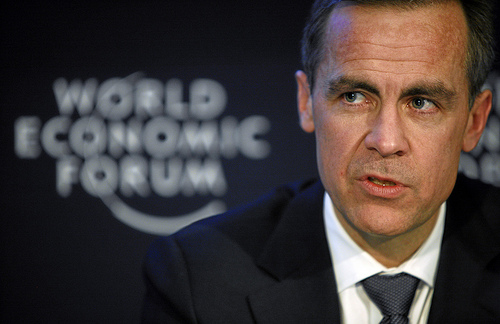Mark Carney’s tenure as Governor of the Bank of Canada overlaps some challenging economy history. Appointed in early 2008 just as the U.S. housing bubble was popping, Carney took the helm in time for a financial crisis that brought the global economy to its knees. We are still living that history in terms of a post-recession stagnant recovery, with depression economics centre stage, with deleveraging due to falling asset prices (housing and other financial assets).
The events of the past four-plus years have (thankfully) driven concerns about inflation well down the priority list for monetary policy. Carney himself raised interest rates prematurely in 2010, suggesting that if he were Governor in normal times we would have seen a much more hawkish presence on inflation. The culture of the Bank of Canada is to see inflation around every corner, which makes it a conservative institution that mostly works for the Establishment. Indeed, the Board of Directors is uniformly while, almost all male, and very affluent — not exactly representative of Canadian society as we know it. The Governor is the most powerful non-elected person in government.
Still, for a central bank governor whose roots are in Goldman Sachs, Carney did an effective job steering monetary policy through the crisis. Goldman Sachs, it should be noted is perhaps the powerful and influential investment bank in the U.S. (Krugman’s piece here shows how Goldman played the White House during the crisis). Yet, Carney developed the opposite reputation for taking on the bankers, pushing for regulatory reforms at the international level through the Financial Stability Board. On the other hand, as David Macdonald points out, the Bank of Canada orchestrated more than $100 billion in cash-for-asset swaps (also involving the Canada Mortgage and Housing Corporation) at the height of the crisis. We can debate the semantics about whether that constitutes a “bailout” or not, but clearly Carney’s Bank of Canada was there for Big Finance when the chips were down. If only households in crisis could get such a great backstop.
Carney’s biggest asset, and the reason why the Bank of England is willing to pay $1 million per year to a foreigner, is that he played the confidence game very well. The actions of a central banker matter, but perhaps more important than the empirical impact of, say, a quarter-point change in short-term interest rates is communicating the perception that a firm hand is on the tiller: signalling to the markets that eagle eyes remain peeled for any sign of inflationary rodents. While seeking to maintain the confidence of financial markets (and to some extent, other governments), Carney was able to bask in the glow of more prudent regulation of the financial sector — that predated his tenure — as a pointer to the stability of the Canadian financial system, and economy. In addition to the “bailout,” banks were chafing against regulations in the years before the crisis, and the Conservatives added fuel to the fire by increasing the CMHC-insured mortgage limit to 40 years, factoids that were deftly swept under the carpet.
Whoever picks up the reins at the Bank will encounter an ongoing delicate recovery, and a pent-up demand by hawks that interest rates must rise back to “normal” levels. Yet, pushing up interest rates due to inflation fears will only further inflate the Canadian dollar (overvalued by 25 per cent according to the OECD), and make it harder for households to pay off debt, which is now at record levels exceeding those seen in the U.S. and U.K. before the financial crisis. At the same time corporate Canada is sitting on piles of cash, a fact that Carney has pointed out, but exhortations are not the same as action that would put that money to use (raising corporate taxes to fund public infrastructure, for example). And housing prices are looking to soften, with some calling for a burst of Canada’s bubble, after a successful rally in the past couple years.
These are some serious structural imbalances. While it is one thing to assert the strength of the Canadian economy, how those play out will be a big determinant on how history remembers Mark Carney.



